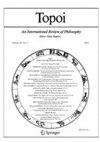Towards a Typology of Narrative Frustration
IF 1.3
2区 哲学
0 PHILOSOPHY
引用次数: 0
Abstract
Abstract Through imaginative engagement readers of fiction become, to an extraordinary extent, the narrator’s ‘children’: they often submit themselves to the narrator’s authority without reserve. But precisely because of that, readers are deeply at a loss when their trust is betrayed. This underscores a core function of fiction, namely to evoke emotional response in the reader. In this paper, we hypothesize how a reader’s imaginative engagement can be subjected to narrative frustration due to processing or moral complexity. The types of narrative frustration we consider differ in terms of their sources, and their emotional and behavioral impacts on the reader. Here, we break down these frustrations into their component parts, in an effort to better characterize the different classes of frustrations. We propose that frustrations arise from different combinations of local uncertainty, moral clash and global uncertainty. These sources of frustration in turn explain the reader’s emotional response and their consequent reading behavior as they imaginatively engage with fiction.走向叙事挫折的类型学
通过想象力的参与,小说的读者在很大程度上成为了叙述者的“孩子”:他们经常毫无保留地服从叙述者的权威。但正因为如此,当读者的信任被背叛时,他们会深感茫然。这强调了小说的核心功能,即唤起读者的情感反应。在本文中,我们假设读者的想象参与如何由于处理或道德复杂性而受到叙事挫折。我们所考虑的叙事挫折类型在其来源以及对读者的情感和行为影响方面有所不同。在这里,我们将这些挫折分解成它们的组成部分,以便更好地描述不同类型的挫折。我们认为,挫折感来自当地不确定性、道德冲突和全球不确定性的不同组合。这些挫折的来源反过来解释了读者的情感反应,以及他们在想象中参与小说时随之而来的阅读行为。
本文章由计算机程序翻译,如有差异,请以英文原文为准。
求助全文
约1分钟内获得全文
求助全文
来源期刊

TOPOI-AN INTERNATIONAL REVIEW OF PHILOSOPHY
PHILOSOPHY-
CiteScore
3.10
自引率
7.10%
发文量
47
期刊介绍:
Topoi''s main assumption is that philosophy is a lively, provocative, delightful activity, which constantly challenges our received views, relentlessly questions our inherited habits, painstakingly elaborates on how things could be different, in other stories, in counterfactual situations, in alternative possible worlds. Whatever its ideology, whether with the intent of uncovering a truer structure of reality or of soothing our anxiety, of exposing myths or of following them through, the outcome of philosophical activity is always the destabilizing, unsettling generation of doubts, of objections, of criticisms. It follows that this activity is intrinsically a ''dialogue'', that philosophy is first and foremost philosophical discussion, that it requires bringing out conflicting points of view, paying careful, sympathetic attention to their structure, and using this dialectic to articulate one''s approach, to make it richer, more thoughtful, more open to variation and play. And it follows that the spirit which one brings to this activity must be one of tolerance, of always suspecting one''s own blindness and consequently looking with unbiased eye in every corner, without fearing to pass a (fallible) judgment on what is there but also without failing to show interest and respect. Topoi''s structure is a direct expression of this view. To maximize discussion, we devote most or all of this issue to a single topic. And, since discussion is only interesting when it is conducted seriously and responsibly, we usually request the collaboration of a guest-editor, an expert who will identify contributors and interact with them in a constructive way. Because we do not feel tied to any definite philosophical theme (or set of them), we choose the topic with absolute freedom, looking for what is blossoming and thriving, occasionally betting on what might - partly through our attention - ''begin'' to blossom and thrive. And because we do not want our structur e to become our own straightjacket, we are open to contributions not fitting the ''topos'', and do not rule out in principle the possibility of topic-less issues.
 求助内容:
求助内容: 应助结果提醒方式:
应助结果提醒方式:


